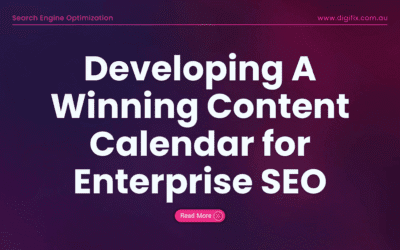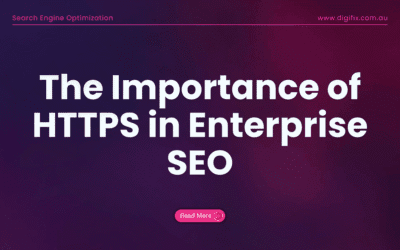In the digital age, businesses of all sizes rely on search engine visibility to reach potential customers. While local and small-to-medium companies can benefit from traditional SEO strategies, large organisations with complex websites require a more advanced approach known as Enterprise SEO.
But what exactly is Enterprise SEO? How does it differ from standard SEO? And why is it crucial for large-scale businesses?
This in-depth guide breaks down everything you need to know.
What is Enterprise SEO?

Enterprise SEO refers to the strategic optimisation of large websites—typically those with thousands to millions of web pages—to improve their visibility in search engine results pages (SERPs). It goes beyond basic keyword targeting and content updates, focusing instead on scalable SEO strategies, automation, technical depth, and cross-department collaboration.
Enterprise SEO is typically used by:
- E-commerce platforms with extensive product catalogues
- Global brands with multiple domains or languages
- Media companies with thousands of archived pages
- SaaS businesses with dynamic and content-heavy sites
The objective remains the same: increase organic traffic, brand authority, and conversions. But the approach is more data-driven, strategic, and resource-intensive.
Key Differences Between Traditional and Enterprise SEO
Scale
Traditional SEO is typically applied to small or medium-sized websites, often with a limited number of pages to manage. In contrast, Enterprise SEO is designed for large-scale websites that may have thousands to millions of pages, such as e-commerce platforms, media sites, or global brand websites. The sheer volume of content demands a more scalable and sophisticated approach.
Strategy
The strategy in traditional SEO tends to be manual and page-specific, focusing on optimising individual pages one at a time. Enterprise SEO, however, requires a more scalable and strategic approach—one that leverages automation, templates, and data-driven insights to optimise at scale. The focus is on creating systems that can apply changes across large sets of pages efficiently.
Team Involvement
While traditional SEO is often handled by a single person or a small team, enterprise SEO demands cross-functional collaboration. It involves coordination between SEO specialists, developers, product managers, content creators, UX designers, and sometimes legal and PR teams. This collaboration ensures that SEO initiatives align with broader business objectives and can be executed effectively across departments.
Tools
Basic SEO tools like Yoast, Google Search Console, or SEMrush are usually sufficient for traditional SEO needs. In enterprise SEO, however, advanced enterprise-grade platforms such as BrightEdge, Conductor, Botify, or SEOClarity are often required. These tools support large-scale analysis, automation, and custom reporting to handle the complexity of massive websites.
Technical Depth
Traditional SEO focuses on standard technical practices such as meta tags, sitemaps, and mobile optimisation. Enterprise SEO dives much deeper into the technical layer, including schema markup, crawl budget optimisation, canonicalisation, site architecture, and advanced performance tuning. The technical depth is essential to ensure search engines can effectively crawl and index extensive web properties without issues.
Why Enterprise SEO is Important
For enterprise-level businesses, SEO is far more than a tactic to improve search rankings—it is a strategic lever for brand positioning, sustainable revenue growth, and long-term market leadership. Given the scale and complexity of large websites, enterprise SEO enables organisations to build a dominant digital presence in a way that smaller SEO efforts cannot match.
- Improved Visibility at Scale
One of the greatest strengths of enterprise SEO is its ability to deliver massive visibility across thousands of keywords and market segments. Unlike traditional SEO, which may focus on a handful of priority pages or search terms, enterprise SEO strategies are designed to optimise thousands—or even millions—of URLs.
This includes product pages, service pages, blog posts, location pages, and more. By doing so, businesses can rank for a broad spectrum of high-value, long-tail, and branded keywords. This expansive reach allows a brand to appear consistently in front of diverse audiences at various stages of the buyer journey, maximising touchpoints and discovery opportunities.
- Revenue Impact
Organic traffic, when driven by effective enterprise SEO, often converts better than paid advertising. Why? Because users landing through organic search tend to have higher intent, particularly when arriving on well-optimised, relevant pages. With enterprise SEO, businesses can fine-tune user experience and content relevance at scale, guiding users toward conversion-focused journeys.
Over time, even small increases in organic conversion rates can translate into significant revenue gains, especially when applied across large traffic volumes. Moreover, by targeting commercial-intent keywords across product or service categories, enterprise SEO helps attract visitors who are ready to engage or buy.
- Cost Efficiency and Long-Term ROI
While enterprise SEO requires upfront investment in tools, resources, and technical infrastructure, it delivers highly cost-efficient results over the long term. Unlike paid ads, which stop generating traffic the moment you stop funding them, SEO efforts continue to drive value well after implementation.
Once enterprise SEO systems are in place—like optimised templates, content structures, and automation pipelines—they can generate consistent traffic with minimal ongoing costs. This makes enterprise SEO a sustainable source of ROI, offering compound returns that outperform many paid media channels over time.
- Brand Authority and Trust
High search rankings are more than just a technical achievement—they are a signal of credibility and authority to users. Appearing consistently in the top results for competitive keywords builds brand trust and recognition. For enterprise businesses, this visibility strengthens their positioning as industry leaders.
When a brand dominates the first page of Google across multiple categories, it communicates to users that the company is established, reputable, and reliable. Over time, this trust turns into increased brand equity, influencing search behaviour and direct traffic, social engagement, and customer loyalty.
- Competitive Edge
In saturated markets, staying ahead of competitors means owning more digital real estate than they do—and enterprise SEO provides that edge. A well-executed SEO strategy can enable a business to outrank competitors across key transactional and informational queries, capture featured snippets, dominate local packs, and gain visibility in image, video, and news search results.
In industries where consumer attention is fiercely contested, this visibility can tip the balance in your favour. Moreover, enterprise SEO ensures you’re not just reacting to competitor moves, but proactively leading with a robust, future-focused search strategy.
In summary, enterprise SEO is a foundational pillar of digital growth for large organisations. It enables businesses to amplify their visibility, boost revenue, improve cost-efficiency, build trust, and outperform the competition—all at scale.
Core Pillars of Enterprise SEO
Enterprise SEO has five foundational pillars that enable large organisations to manage and optimise their search performance at scale. Each pillar addresses the unique challenge of working with expansive websites, ensuring that SEO remains strategic, efficient, and impactful across the entire digital ecosystem.
- Scalable Keyword Strategy
A strong keyword strategy is at the heart of any SEO effort. For enterprise-level websites, it must be vast, precise, and scalable. Instead of targeting a limited set of keywords, enterprise SEO requires mapping branded and non-branded keywords, high-volume head terms, long-tail phrases, and product- or service-specific queries—all across potentially thousands of landing pages.
It means creating a comprehensive keyword taxonomy that aligns with various user intents, product categories, buyer stages, and geographical regions (if applicable). Manual keyword tracking quickly becomes impractical, so enterprise SEO relies heavily on automation and AI-driven tools to continuously monitor keyword performance, identify new opportunities, and prioritise updates.
This scalable approach helps brands dominate SERPs across multiple verticals, improve content targeting, and maintain relevance as search behaviour evolves.
- Advanced Technical SEO
Enterprise websites are often complex, with deep navigation structures, dynamic content, and large volumes of URLs. Ensuring these websites are fully accessible and understandable to search engines requires advanced technical SEO practices.
Key areas of focus include:
- Site Architecture & Internal Linking: Organising content logically and using strategic internal links to distribute authority and help search engines crawl priority pages.
- XML Sitemaps & Robots.txt Management: Providing clear signals to search engines on which pages to crawl or ignore, especially on large websites with limited crawl budgets.
- JavaScript Rendering: Ensuring critical content and navigation are accessible to crawlers, especially for websites that rely heavily on client-side rendering.
- Mobile-First Indexing: Optimising for mobile performance and usability, as Google now indexes the mobile version of a site first.
- Site Speed Optimisation: Reducing page load times through image compression, efficient code, and content delivery networks (CDNs) to improve user experience and SEO rankings.
- Crawl Budget Management: Prioritising crawl frequency for high-value pages while avoiding unnecessary crawling of low-priority or duplicate URLs.
- Canonicalisation & Duplicate Content: Prevent internal content cannibalisation and ensuring that search engines index the correct version of each page.
- Content Optimisation at Scale
Enterprise websites often contain thousands of product pages, blog posts, and landing pages—making manual content optimisation impossible. Instead, enterprise SEO uses programmatic and template-based content strategies to deliver consistent optimisation across entire categories or sections of a website.
This involves:
- Creating content templates with built-in SEO elements (meta tags, H1s, schema markup)
- Leveraging AI tools for content generation, keyword inclusion, and tone consistency
- Using structured data (like FAQs, reviews, and product details) to enhance pages for rich results
- Implementing global content updates using content management systems (CMS) or headless CMS platforms
Programmatic optimisation enables large businesses to quickly deploy SEO improvements across thousands of pages without sacrificing quality or relevance. It also ensures that content stays aligned with brand messaging, user needs, and search intent.
- Automation and AI Integration
Manual SEO processes cannot keep up with the pace or scale required by enterprise websites. That’s why automation and artificial intelligence (AI) are critical components of enterprise SEO.
Automation platforms like BrightEdge, SEOClarity, Botify, Conductor, and Semrush Enterprise offer capabilities such as:
- Keyword Tracking at Scale: Monitor thousands of keywords across multiple locations, devices, and SERP features.
- Competitor Analysis: Continuously track competitors’ rankings, backlink profiles, and content strategies.
- Content Performance Recommendations: Use machine learning to suggest content updates based on real-time performance data.
- SERP Feature Monitoring: Identify opportunities to appear in featured snippets, People Also Ask boxes, image packs, and local results.
With AI integration, teams can also predict ranking shifts, automate internal linking, and discover untapped content gaps. These tools empower marketers to spend less time on repetitive tasks and more time on high-impact strategy and optimisation.
- Cross-Department Collaboration
One of the most distinctive features of enterprise SEO is that it requires alignment across multiple departments within the organisation. SEO is no longer confined to the marketing team—it touches every aspect of digital operations.
Key collaborators include:
- Content Creators: To write, edit, and structure content that satisfies search engines and users.
- Developers: To implement technical SEO fixes, deploy structured data, and ensure site performance.
- UX/UI Designers: To improve user experience, page layout, and accessibility, all of which influence SEO indirectly.
- Marketing & PR Teams: To support brand-building, secure backlinks, manage reputation, and amplify content.
- Product Teams: To ensure product and feature pages are optimised and aligned with customer search intent.
- Legal & Compliance Teams: Especially for global or regulated industries, to ensure all content meets legal requirements.
When all teams work together, SEO becomes an integral part of the business strategy, rather than an isolated tactic. This collaboration ensures that initiatives are executed efficiently and deliver results across all digital touchpoints.
Final Thoughts!
Enterprise SEO is not just a bigger version of standard SEO. It’s an entirely different beast. It involves strategic thinking, cross-team collaboration, automation, and advanced tools to optimise performance across a massive digital footprint.
For large businesses, investing in Enterprise SEO isn’t optional—it’s essential. It drives measurable ROI, strengthens brand authority, and positions your company for long-term growth in an increasingly competitive digital landscape.
If you’re a large business looking to elevate your search presence, working with an experienced Enterprise SEO agency is often the smartest first step.
DigiFix: The Best Enterprise SEO Agency in Melbourne
At DigiFix, we pride ourselves on being the best Enterprise SEO agency in Melbourne, trusted by leading brands to deliver measurable, scalable, and sustainable search performance. Our Enterprise SEO services are tailored to meet the demands of large, complex websites—helping businesses dominate search engine results, drive consistent traffic, and achieve long-term digital growth.
What sets DigiFix apart is our deep understanding of enterprise-level challenges and our ability to solve them with precision. Whether you’re managing thousands of product pages, targeting multiple regions, or coordinating across teams, our strategic approach ensures your SEO is aligned with your broader business goals.
What Our Enterprise SEO Services Include:
- Scalable Keyword Strategy
We perform in-depth keyword research that goes beyond the basics. Our team builds intelligent keyword maps that include branded and non-branded terms, long-tail keywords, and high-value commercial queries—all managed through advanced tools to target users at every stage of the funnel.
- Advanced Technical SEO Audits & Implementation
Our technical SEO specialists ensure your large-scale site is structured for success. From crawl budget optimisation and canonicalisation to mobile-first indexing and site speed improvements, we handle it all—ensuring search engines can efficiently crawl, index, and rank your content.
- Content Optimisation at Scale
We develop SEO-driven content strategies using programmatic optimisation, AI-powered tools, and dynamic templates. This enables us to update and optimise thousands of pages efficiently, all while maintaining consistent quality and messaging across your brand.
- Automation and AI-powered SEO
As a forward-thinking agency, DigiFix integrates the latest AI and automation tools like BrightEdge, Semrush Enterprise, and SEOClarity to track keyword movements, monitor SERP features, and deliver actionable insights in real time.
- Cross-Team Collaboration Support
We work closely with your internal teams—whether it’s marketing, development, product, or content—to implement SEO strategies without disrupting existing workflows. We also assist in training and supporting your staff to ensure alignment and execution excellence.
If you’re ready to elevate your search presence, increase organic revenue, and future-proof your digital strategy, DigiFix is your trusted partner. Contact us today to discover why we’re known as the best Enterprise SEO agency in Melbourne—and how we can transform your website into a powerful driver of growth.





0 Comments